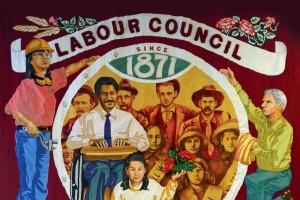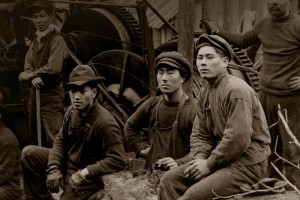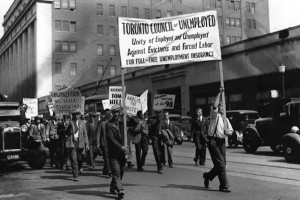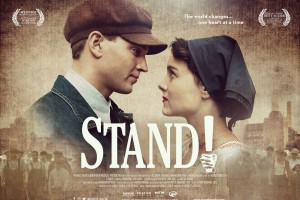It's the end of summer and we are in the Atlas Mine Museum just south of Drumheller, not far from some of the world's largest dinosaur diggings. Don Bouzek is videotaping the reconstruction of timber supports in a mine shaft more than 100 feet above us, while Susan Keeley and I are interviewing retired miners in an old mine office that is baking in the 30-plus degree valley heat.
We are doing labour history in an area that witnessed some of the most radical trade union action in Canada's history. Slim Evans worked in this valley, and was sent to jail for his union activities, trying to feed starving miners' families in the 1920s. This was part of a region hotly contested in the early 20th century between the One Big Union and the United Mineworkers of America, at the same time as pitched battles took place between the Northwest Mounted Police and picketers, and vigilante squads drove strikers' families out of their homes. It was also just south of here, when miners' strikes spread to Lethbridge in 1906, that William Lyon Mackenzie King, Canada's first Deputy Minister of Labour, visited, before returning to Ottawa to draft some of Canada's first labour legislation requiring conciliation before striking.
Our visit here is another instalment in a decade of efforts to collect and preserve the history of Alberta's working people and the communities they built. Susan Keeley is a long-time Calgary labour activist and a recently retired representative with the Canadian Union of Public Employees, who decided that this is now how she wants to spend her time. Don Bouzek is one of the best-known videographers, community arts and cultural producers to work with Canada's labour movement. I'm an industrial relations academic at Athabasca University, with a lengthy background as a staff member with Alberta's trade unions.
We are part of a growing collective of trade unionists, academics, labour archivists, political activists and writers who came together, under the banner of the Alberta Labour History Institute (ALHI), to preserve and tell the story of Alberta's working people and their organizations. It was up to us to record our stories, we decided some time ago; otherwise history would continue to be dominated by the narrative of bosses and their corporate friends.
Since the founding meetings in 1998 at Rosie's pub and a few other places in downtown Edmonton, the ALHI has undertaken a growing number of activities, and we are now widely recognized in Alberta's labour community and the public at large. Among other activities, we have interviewed over 300 leading trade unionists and community activists as part of an oral history project; preserved and archived records, photos and publications; produced an annual Alberta labour history calendar; hosted public Labour History Days; provided material for city and provincial centennial celebrations; and made presentations to trade unions, schools and other organizations.
ALHI has also played a role in the production of television shows, videos and audiotapes, responded to requests for university-level research and teaching purposes, and helped a number of unions and organizations celebrate their anniversaries. We've constructed an Alberta Labour History Timeline and other guides to labour events, and now maintain a website as a repository and information source for Alberta labour history. Our board meets once every two months, and, in the intervening months, we meet to view films, hold discussions and socialize with each other.
Enlisting Retired Trade Unionists
ALHI has been able to accomplish all of this with mostly volunteer labour because of the resources it has been able to marshall. Prime among these are our labour retirees, typically an undervalued resource in the labour movement. Only a few trade unions have been able to make use of the incredible contribution retired trade union staff, members and leaders can make. These are people with vast amounts of energy and knowledge; an amazing resource, if properly harnessed.
Dave Werlin, ALHI's current president, typifies this energy. A former CUPE representative, regional director, and communist, Werlin became president of the Alberta Federation of Labour in the 1980s. This was the period in which the Government of Alberta declared war on its trade unions, giving rise to the "Dandelions" direct action group in the Building Trades, and some of the most memorable strikes of recent times, including the infamous "Battle of 66th Street" at Edmonton's Gainer's Plant in 1986.
"In far too many cases, the history that is being told does not contain any stories of workers and their communities," Werlin says. "The central mission of ALHI is to tell this story, and who better to do it than the people who devoted their lives to building strong unions and stable communities?"
Walter Doskoch was another union veteran. A leading human rights activist and business agent with the United Association of Plumbers and Pipefitters (UA Local 488), he and fellow staffers Jack Hubler and Sam Lee provided ALHI with an invaluable link to Alberta's building trade unions. The fact that he passed away within months of doing one of the first interviews in ALHI's oral history project drove home the urgency of our work: we needed to record our history before we lose it forever. Another notable founding member was Neil Reimer, first leader of
Alberta's NDP and the Canadian director of the Oil Chemical and Atomic Workers, who led his members out of the international union to ultimately become members of the Communications, Energy and Paperworkers Union of Canada (CEP).
For Werlin, Keeley, Hubler, Reimer and so many other veterans, ALHI offers an avenue through which they can continue their work with trade unions. Just as importantly, it provides one of the too few bridges across Alberta's badly-fractured labour movement, which, today, sees so many of the province's largest organizations going it alone, including the 70,000-member Alberta Union
of Provincial Employees (AUPE), and most of the Building Trades.
"How often do these people get together and put aside their differences to actually collaborate on anything, including projects that all agree with?" Bouzek asks. "No matter how bitter today's arguments, we must find ways to keep lines of communication open amongst the good people in these organizations, so when the political climate changes, as history shows it surely will, there will be something to build on."
ALHI's board also includes a number of leading academic historians. Alvin Finkel and Jeff Taylor are well-known and highly-published labour history professors at Athabasca University, and James Muir, a recent (and younger) addition, teaches legal history at the University of Alberta.
In this way, ALHI provides a rare venue for academic historians to interact directly with activists in the labour movement, in spite of the huge political and spatial gap that so often separates them. This gap has already been bridged with such trade unions as UFCW Local 401 (United Food and Commercial Workers), which helped win very significant strikes in Alberta's recent history, bringing industrial organization to some of the most exploited workers, and the most determined anti-union employers, in Canada. Today, workers in Edmonton's Palace Casino and new Canadians at Lakeside Packers' in Brooks, Alberta, both have unions because Local 401 stood behind them in strikes that lasted for many months. ALHI was there to record these events.
History from the Worker's Perspective
Finkel sees ALHI's prime mission as the collection, preservation and dissemination of first-person accounts of major events and developments in Alberta's labour history. "Working people have learned the lesson that it is up to them and their friends to get the message out," he says.
"We can't depend on the corporate media or mainstream historians to do it for us; the reporting we have seen in the last few years has certainly taught us that!"
Don Crissal, a UFCW Local 401 representative, typifies this ideal, and the vision that Bouzek and others have, of a network of labour videographers on the spot throughout the province to capture stories right when they happen. After attending an ALHI videotape training session eight years ago, Crissal went on to capture front-line footage on a number of critical occasions, such as when UFCW Local 401 president Doug O'Halloran was run off the road by company goons during the 2005 Brooks strike.
Our ALHI work extends far beyond trade unions, however. We continue to emphasize the broader history of working people and their communities, especially as trade unions failed so many groups of workers in the past. For instance, ALHI is working with Aboriginal people to correct their exclusion from current historical accounts of Alberta's working class. And our oral history project is expanding to incorporate Black communities through the work of such ALHI members as Jennifer Kelly and Donna Coombs-Montrose.
Kelly is a professor at the University of Alberta who spearheads a number of projects to preserve the history of Black pioneers and later immigrants, and also participates in a project involving Black settlers of Alberta and Saskatchewan. Coombs-Montrose is a former archivist for the Oil Workers in Trinidad, who brought her passion for history with her when she moved to Canada.
Another historian, Catherine Cole, has led a project that tells the story of the Eastern European, Asian and other women who laboured at Edmonton's unionized GWG jeans plant from 1911 to 2004, which was the year its owners, Levi Strauss, left Canada in favour of the low-wage haven offered in Haiti. We were able to support this project in a number of ways, including obtaining recognition of the union's founding as an official historical event of national significance.
Spreading the Message
An ambitious Alberta centennial labour history project was undertaken in 2005 by ALHI during Alberta's 100th anniversary, in the belief that the story of Alberta's working people needed to be celebrated as an important part of our legacy. A grant from Heritage Canada, together with targeted fund-raising, allowed ALHI to undertake a "Centennial Road Show," in which members visited communities across the province to hold meetings, scour libraries, museums and resource centres, and collect hundreds of stories, together with pictures, books, artifacts and other information, about working people, their work, their trade unions and cultural organizations.
Material collected in this way, together with materials ALHI had already assembled, were used to populate an electronic database that became the basis of the Centennial Labour History Website (www.labourhistory.ca). The site, designed and maintained by Ron Patterson, a
longtime activist in Edmonton's labour and left community, contains a growing number of pictures and stories of people and events from labour's past, and provides a guide to numerous other locations, historical resources and stories.
The creation of a website also made it possible for ALHI to pursue a comprehensive project in partnership with the Aspen Foundation for Labour Education (AFLE). When it is completed, the guide called "Labour History and the Alberta Social Studies Program of Studies" will show teachers how to bring labour history into their classrooms in a way that's consistent with the guidelines provided by the Province and their professional associations.
The value of first-person worker accounts was illustrated once again this past June when ALHI released a DVD entitled Shutdown at Edmonton Celanese: The Workers' Story. The result of 10-months of interviewing, transcribing, editing and production by ALHI volunteers and contractors, this is the story about how the huge plant in northeast Edmonton was finally shut down on June 30, 2007 after 54 years in operation. In keeping with our tradition of oral history, the story is told primarily by the workers at Celanese, as well as some of their union and community leaders.
They all relate with pride how they built a strong union and a working-class community around a profitable, diversified plant, only to see it shut down by one of the many private equity companies that operate with impunity in an increasingly globalized world economy.
Celebrating 100 Years
Project 2012 is ALHI's latest and most ambitious project. Undertaken jointly with the Alberta Federation of Labour, it will build on the AFL's upcoming centennial in 2012, which provides a unique opportunity to draw attention to the role that Alberta's unions have played, and continue to play, in building this province. Strongly supported by Gil McGowan, the AFL's current president, Project 2012 began after delegates to the May 2007 AFL convention voted unanimously to sponsor events and projects leading up to their centennial, asking ALHI to play a key role in the process.
In his interview for ALHI's Celanese Project, Neil Reimer focusses on the pride and dignity that workers typically find in the work they do and the communities they build, saying, "More than any wage increase, they remember what you've done for society. People are socially conscious if you allow them to be." This is the essence of the collective spirit that runs through the stories the Alberta Labour History Institute has been compiling, disseminating and preserving for the future.
We believe that people need a solid grasp of their past if they are to play an active part in building their future. By recording the history of Alberta's working people, we are helping to shape it.
PLANS FOR CELEBRATING 100 YEARS
Project 2012, a joint project with the ALHI and the Alberta Federation of Labour, which will be celebrating its 100th anniversary in 2012, includes the following plans:
* four short videos on selected events, people or developments each year that will culminate in a DVD portraying 100 years of Alberta labour history;
* two large posters each year portraying key themes in Alberta's labour history for posting in union offices and halls, schools, universities, and other public buildings across Alberta;
* community visits across the province to hold meetings, talk to Alberta workers, conduct research and collect materials;
* a dedicated Project 2012 website to serve as a focal point for collecting and disseminating stories about 100 years of Alberta labour;
* a series of historical booklets covering specific periods in Alberta labour history. The first, an account of the radical past of Alberta's Crowsnest Pass communities, was written for ALHI by well-known Edmonton author Linda Goyette;
* a comprehensive book on Alberta labour history since 1912 that will reflect much of the research undertaken during the five-year project;
* preparations for a series of events in 2012: theatre, artistic expositions, banquets that will serve to spread the story and celebrate Alberta labour history, and which will culminate in a special AFL centennial convention;
* promotional materials, including brochures or pamphlets, letterhead, display materials, and advertisements to publicize the Project and its developments, and;
* a number of other possible activities, including a CD of labour history music by Alberta artists such as Maria Dunn and the Notre Dame des Bananes choir. W.G.
The Workers’ Story
Alberta’s Labour History Institute
Winston Gereluk is academic coordinator of Industrial Relations and Human Resources at Athabasca University, and vice-president of the Alberta Labour History Institute.














